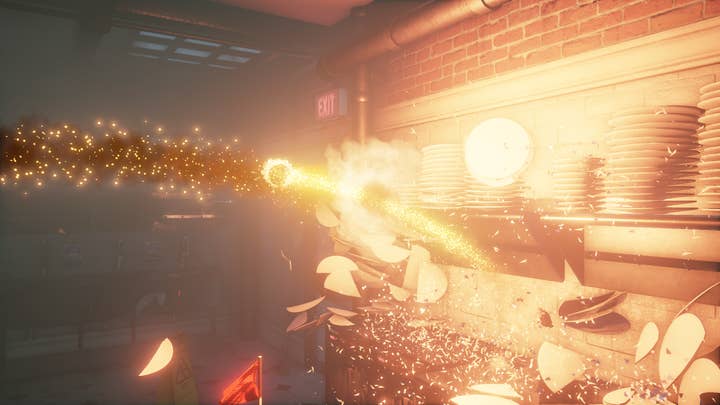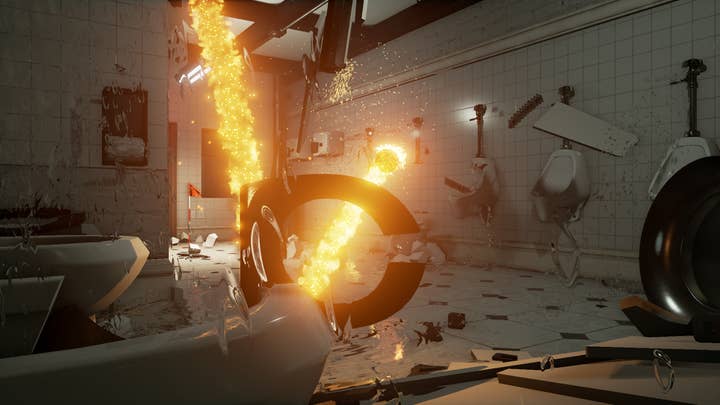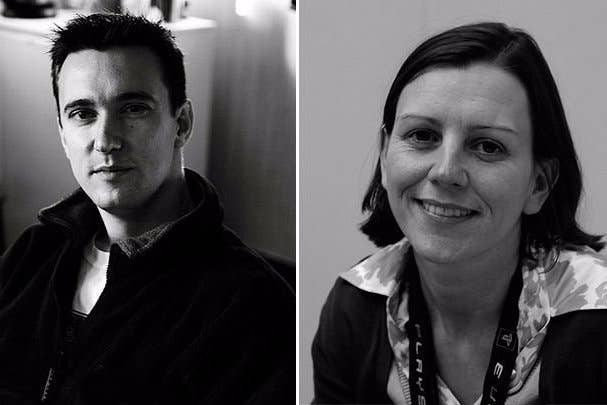"Now is easily the best time to be making games in the UK"
Three Fields' Criterion veterans explain why they're making a golf game...
When Fiona Sperry and Alex Ward left Criterion back in 2014, it felt a bit like the end of the studio. Staff numbers had been drastically reduced already, with just 17 staff remaining on a team that had worked on a list of AAA classics. Most notably the venerable Burnout series, and the explosive shooter Black. Criterion survived, and it is still working on racing titles for EA, but it is fair to say that the departure of Sperry, Ward and later CTO Paul Ross left the team diminished, with fans of its work wanting more.
Sperry and Ward quickly assuaged those fears, establishing ThreeFields Entertainment in March 2014 and employing Ross soon after. With the band back together, they started work on a new project. Ward teased the new game with promises of a line of pedigree to their previous work.
Nearly two years later and the wraps are off. But this isn't a new racing game or a first-person shooter. It's not a AAA boxed product stuffed with shiny cars and an expensive soundtrack. Instead, ThreeFields is giving that s*** up to concentrate on golf, at least for now. So what led some of the UK's finest racing devs to switch genres completely, and what does golf have in common with high-octane destruction?
"The more people said that we couldn't do something the more we wanted to do it, if only to piss them off. It's innate to us"
"A core team of us came together who wanted to change the way that we worked, to regain total creative control," explains Ward. "We were bouncing around ideas about what we wanted to do. Not just for this generation, but going forward, dreaming about what we think a next generation will be. We started to look at stuff from SIGGRAPH on physics and fluid simulation and at clips from our favourite movies. We were looking at Inception and various X-Men movies, working out what we could do. I was also watching some guys on YouTube called DudePerfect, who are trick shot specialists: basketball, pool, incredible stuff. I'm a terrible pool player because I try and go for the trick shot every time, bank it off all the rails. I'm still rubbish after several years of practice.
"If you look at the games that I've produced since 2000, destruction, arcade-style multiplayer and put-a-smile-on-your-face action are the common themes - that's what we're passionate about. So we started thinking, 'Why don't we create a new type of sports game,' as sports games can often be spectacularly dull. They're not for everyone. This isn't really about golf, in the same way that Burnout was never really about motorsports or careful driving. It was for people who wanted to drive like an idiot and have a good time, a nod to my favourite SEGA coin-ops of old. So we thought we'd take on golf with the same approach: 'Can you smash the place up and bang it in the hole?' So we've made a trick shot golf game about destruction.

"We're proud of all the games we've worked on, but we don't look back with nostalgia as such. Without being too hard on ourselves, we look back with the intention of taking it to a new place. This was never going to be a straight up game of golf. I think we started by agreeing that golf was boring, golfers are boring, and golf games are boring."
It makes sense, when you think about it. Racing games were a great repository for speed and accessibility, alongside huge explosions, but those properties aren't exclusive to the genre. Almost anything can be blown up, after all. But golf? I mention to Sperry and Ward that their games are characterised by a sense of the player being the anarchic force in an otherwise quite regular world, that your presence is the source of all the chaos. That seems to translate to golf with ease.
"It's interesting that you describe it that way actually, I've not heard many people outside of the team talk about it that way," says Sperry. "The new game has a lot of that to it. You can see it's a beautiful world, which you then go into and destroy. That's a similar approach to Burnout. It was never about being too over the top. It's not crazy with a K."
"We believe that, with the technology which is available today, even small teams can compete with the bigger studios"
"When I said 'if you liked Burnout...' on Twitter, that's why," adds Ward. "Those games were always a passion project. We put our hearts and souls into them, our personalities, and I know what you mean when you say that. There's a year-long punk festival going on in London now, which I was tweeting about the other day. I grew up in London in the Seventies. I wasn't quite old enough for punk in '76 because I was born in '72, but my family had a big influence. As a British developer that's always been a big influence. The more people said that we couldn't do something the more we wanted to do it, if only to piss them off. We have that sort of mind-frame. It's innate to us.
"There's a punk ethos that runs through Britain. We're passionate about British development and we want to help it survive. I grew up playing all the great games that came out of the country. We've got the best talent in the world and a great climate for coding - if you can't go outside you might as well stay in and write a good game. We just hope that more teams can have a go. Just like in 1999 we're a small team trying to take over the world."
Sperry and Ward both seem overjoyed at regaining direct control over their destinies. Neither expresses any regret or bad feeling about what happened at Criterion, but there's a palpable camaraderie and a sense of reunion. They're self-funded, and self-publishing, happy with a small team. Sperry says that might change, but probably not by much.
"It's certainly why we started a smaller company, because it's possible to succeed as a small team," she says. "The tech exists, we don't need a big publisher. That's not to say we'd never work with a big publisher. We didn't come out of our previous experience with a negative attitude, we had a great time and our games had a huge success because of the relationships we had, but at the moment it suits us to do this and the market exists for it.

"We believe that, with the technology which is available today, even small teams can compete with the bigger studios. That's what we're setting out to prove with this game. We're not looking to fill a massive hall with developers."
"That would be my dream," adds Ward, his laughter dripping with sarcasm. "A massive 900 man team, that would be amazing. Walking around and not knowing anybody's name, having a team meeting where you have to rent the local football field. No. The best times I've had have been in small teams. Everyone knows each other, we all play the same games, watch the same TV and films. Games are made by people, and close teams are very important to that. We've been through that wringer before. When we were at Criterion we started off very small but over the years it grew to be massive. It's not particularly fun or creative.
"Games are made by people, and close teams are very important to that. We've been through that wringer before"
"We want to go back to our roots: a small team with great tools, great tech, making what we want however we want to do it. We can work on whatever platform we want, when we want, from wherever we want, taking as many holidays as we like. That's what we're all about.
"This company is based on three things: 1) Make great games; easy to say, very hard to do 2) Have fun; it's the games business not the work business, after all, and 3) Do the right thing. When you're a small team you can make your own decisions each and every day. A friend of mine at Microsoft said that you can always tell the pulse of the team when you see the game. Hopefully we can create something sustainable. We're just doing what we love.
"I think the tech makes such a difference. We've got the best generation of hardware anyone's ever seen, as are the tools. Even the licensing models have changed for the better. We've been working really closely with the guys from Unreal recently, in Guildford and America, and the guys from Nvidia, who have been brilliant. But I think the UK has great talent coming out of the universities, it's got a great gaming culture, it certainly inspired me. Now is easily the best time to be making games in the UK."

